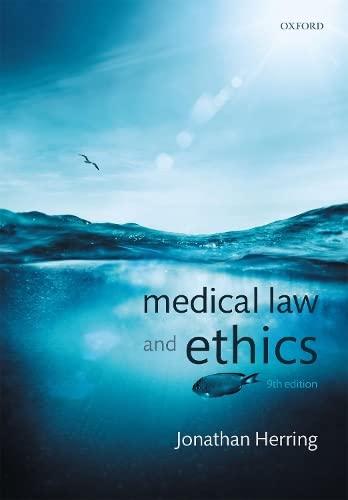Question
Question 50 What type of painful stimuli can be applied in calculating the Glasgow Coma Scale for both motor and eye-opening responses, and how should
Question 50 What type of painful stimuli can be applied in calculating the Glasgow Coma Scale for both motor and eye-opening responses, and how should these be applied? Question 51 How can the Glasgow Coma Scale be assessed in a patient with receptive or expressive aphasia? Question 52 How common is it for someone suffering a transient attack (TIA) to totally lose consciousness? Also, what is the mechanism for losing consciousness with a TIA? Question 53 What should the management be for a stenosis in the carotid artery causing transient ischaemic attack (TIA), and when is surgery recommended? Question 54 In a patient with central retinal artery branch occlusion with carotid artery stenosis, what is the best management: warfarin, aspirin or carotid endarterectomy? Question 55 If a young patient who has suffered a stroke has a normal mental state, would this exclude a cerebral venous occlusion as an aetiology? Question 56 Does persistent hiccough following cerebrovascular ischaemic stroke localize to the medulla or to any other site? Question 57 By what mechanism is vertebrobasilar insufficiency associated with circumoral numbness? Question 58 Why does lateral medullary syndrome result in ipsilateral diplopia due to cranial nerve VI? Neurological disease 21 227 Question 59 I have seen many established ischaemic stroke patients with CTdocumented capsular infarction and hemi-hypotonia despite exaggerated reflexes. How would you explain the hypotonia? Could it be due to a corticorubral fibre lesion? Question 60 Thrombolytic therapy is used in patients with a cerebral infarct within the first 3 hours, whereas stroke by definition lasts 24 hours. So how do we define that it is infarct and not a transient ischaemic attack (TIA) on a CT scan within the first 3 hours in order to start tissue plasminogen activator (tPA) treatment? Question 61 I want to ask something about cerebrovascular accident (CVA). Can you please tell me how we can rapidly pinpoint the exact anatomical site of the neurological deficit using physical findings in the emergency room? Question 62 Why do you treat dissection of the carotid artery with an anticoagulant in the acute management of stroke secondary to dissection? To me this seems paradoxical as it would increase the severity of dissection. Question 63 Last week, in a neurology viva, I was asked about the indications for heparinization in patients with a stroke. I want to know when I can stop heparin and what test I should use for assessing its therapeutic range. Question 64 Has heparin a role in the management of acute ischaemic stroke not accompanied by atrial fibrillation? Question 65 1. In the treatment of a stroke, does low-molecular-weight heparin (LMWH) have an advantage over heparin? 2. In an ischaemic stroke in evolution, for how long should heparin be administered? Question 66 Can streptokinase be used in acute cerebral infarction and, if so, what is the dose? Question 67 There seems now to be a consensus about starting aspirin therapy in acute ischaemic strokes as early as possible. Why has this changed from 21 Neurological disease 228 past recommendations to avoid aspirin early (during the first 48 hours) during the ischaemic stroke on the pretext that it could convert an ischaemic infarct into a haemorrhagic one, thus increasing the dangers of complications like cerebral oedema and raised intracranial pressure? If both opinions are based on clinical trials, what is the significance of the much hyped 'evidence-based medicine'? Question 68 I understand that a loading dose of clopidogrel 600-900 mg can be given to ischaemic stroke in evolution and can stop the evolving deficit. Would you agree? Question 69 Is there any rationale for giving patients with recurrent strokes a combination of aspirin and anticoagulant? Question 70 1. Does a dipyridamol-aspirin combination have any superiority over aspirin alone in the secondary prevention of a stroke? 2. Is an aspirin plus anticoagulant combination superior to a dipyridamol aspirin combination in the treatment of recurrent ischaemic stroke not controlled by aspirin alone? Question 71 1. Is it safe to give piracetam to patients with primary intracerebral haemorrhage? Does it have a neuroprotective effect? 2. Is it safe to give a patient with excessively high blood pressure (as a sequela to recent primary intracerebral haemorrhage) angiotensin-converting enzyme inhibitors to lower the blood pressure? 3. Is it indicated to give piracetam or vincamine to a patient with middle cerebral artery territorial infarction? Do these have any neuroprotective effect? Question 72 What is the mechanism by which subarachnoid haemorrhage is associated with subhyaloid haemorrhages on fundus examination, and how can cerebrospinal fluid (CSF) gain access to the subhyaloid space inside the eye? Question 73 What is the recommended dosage for nimodipine given intravenously in cases of subarachnoid haemorrhage, and when should the treatment start? For how long should the dose be continued? Neurological disease 21 229 Question 74 I read recently that hyperuricaemia has something to do with stroke? Is it recommended to give allopurinol to stroke patients irrespective of their serum uric acid? Question 75 Is there a link between hyperuricaemia (although asymptomatic) and atherosclerosis and cerebral ischaemic stroke?
Step by Step Solution
There are 3 Steps involved in it
Step: 1

Get Instant Access to Expert-Tailored Solutions
See step-by-step solutions with expert insights and AI powered tools for academic success
Step: 2

Step: 3

Ace Your Homework with AI
Get the answers you need in no time with our AI-driven, step-by-step assistance
Get Started


